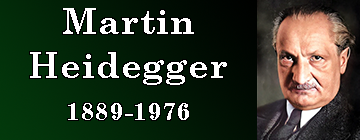



Martin Heidegger, (1889-1976), was a German philosopher famous for his theories of 'being' and 'human nature'. He explored the question of what it means to be.
He criticised Cartesian thinking, (Descartes and after), for not going beyond establishing that 'I' exists, and not inquiring into the nature of the existence of that entity which 'I' am. He held that Western philosophy, since Plato, had not considered this question as significant.
Heidegger was a professor at the University of Marburg when he published his most notable work 'Being and Time', which attempts to revive ontology through an analysis of what he calls 'Dasein', or 'being-in-the-world.'
For Heidegger the concept of Dasein is a particular way of existing, different from the ordinary existence of things in the world around us (which are determinate and have their distinctive properties). The 'I manifest' is not that of a thing-with-properties, it is a range of possible ways to be. The 'I' defines the individual: I become, by projecting myself into those possibilities which I choose, or which I allow to be chosen for me. Who I become is a matter of how I act in the contexts in which I find myself. My existence is always an issue for me, and I determine by my actions what it will be. Human existence is always a projecting of oneself into the future: it is at any moment being essentially 'on the way' from what we were and sought to be, towards what we will be.
Heidegger essentially takes the 'I', defined by Descartes as a thinking being, and expands it to include the effects of the entire environment in which 'I' find myself—a gestalt.
He also conceptualised time in terms of the 'I'. Time is understood, not as stretching towards an unlimited future, but towards an indefinite future, limited by death. So our way of being is essentially finite, an ineluctable movement towards ceasing to be. (Awareness of mortality is an essential of Dasein.)
The ways individuals exist vary. Some lead a life of superficiality and idle chatter, and let their lives be determined by social convention and conformism: their existence is inauthentic. Others engage with the world in awareness of their mortality; they live in a way that is genuinely self-determining and self-revising. Their existence is more authentic: it is in keeping with their ontological nature.
We find ourselves 'thrown' into a world, for no discernible reason. We are immersed in this world and deal with the things in it by bridging the gap between a self-enclosed consciousness and external objects, by relating objects to our practical concerns: as tools, as something at hand, or missing. It is only by subsequent abstraction that we develop our theoretical concepts and regard things with their essential and accidental properties as objects of theoretical knowledge, and this in turn leads us to think of our existence as if it is of the same kind as that of objects. (See 'Language Logic: Objectification.)
The 'Dasein' of the 'I' is different from the ordinary existence of things we perceive in the world around us. (They are determinate and have their distinctive properties — their kind of being.) But the sort of being that 'I' manifest is not that of a thing-with-properties, it is a range of possible ways to be.
It is by revealing the fundamental features of Dasein — of the kind of existence we have — that we can come to understand other kinds of existence, i.e. other senses of 'being', and thus answer what Heidegger calls 'the question of being'.
By finding the right way of dealing with this question, Heidegger hoped to overcome the tradition of Western metaphysics that began with Plato. Its main shortcoming is its 'forgetfulness of being'. Traditional metaphysics tends to single out certain privileged entities (the Forms, God, a transcendental Self, Spirit, etc.), thereby forgetting the fact that our understanding of being is based on the way we are in the world and relate to entities in it. This defect in traditional metaphysics leads to the misguided quest for a definitive theory of everything: a total account, once and for all, of why things are as they are.
It is not only inner states (the sense of dread, of being 'thrown', of boredom, of guilt, etc.) that philosophy can understand as disclosures of being, but also certain social and cultural conditions. The modem cult of 'technology' — a way of relating to the world that treats things only as objects of domination and consumption, without insight into its own limitations — is itself an expression of nihilism, the only philosophy left for a metaphysical ambition that has failed to reach its objective.
It is a mentality that can be overcome with a better insight into the true meaning of what it is to be, and with the rejection of what Heidegger called 'humanism', reason's claim to be able to know the world exhaustively and to put it entirely to human use. The calculative thinking of modem science and the resulting technology cannot sensibly be resisted, but it can be transcended by a kind of 'inner emigration' away from the intrusiveness and superficiality of modem life towards Gelassenheit — detachment; leaving things be; serenity — in which one has come to terms with one's own mortality.
Heidegger's work has influenced such varied fields as theology (Rudolf Bultmann, Karl Rahner), existentialism (Jean-Paul Sartre), contemporary hermeneutics (Hans-Georg Gadamer), and literary theory and deconstruction (Jacques Derrida).
There has been heated controversy around Heidegger's thought. Admirers have found in him penetrating insights into the deeper truths about the human condition and the nature of man. Critics have complained of obscure language, weak arguments and dubious etymologies; and there has been much debate as to whether his political stance, (outspoken support for Hitler and Nazism), reveals a deep flaw in his philosophy.
* * * * *